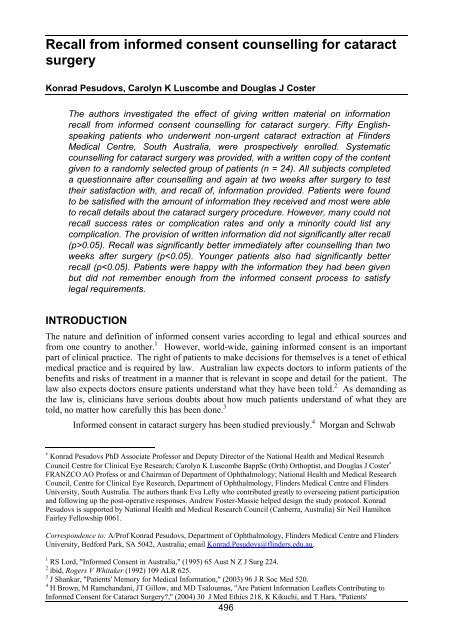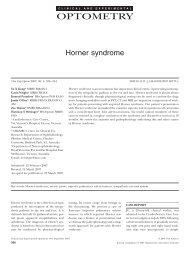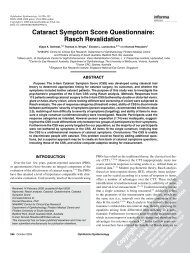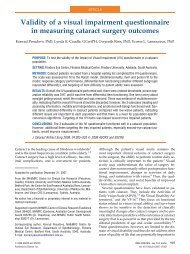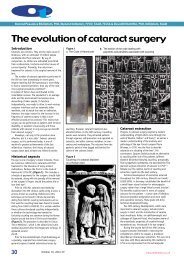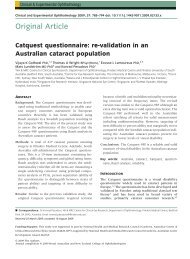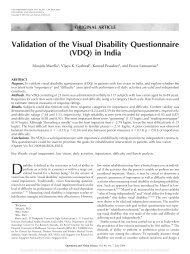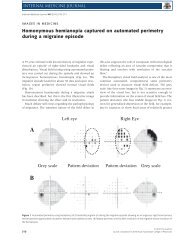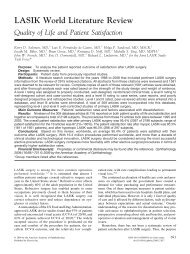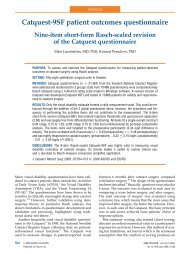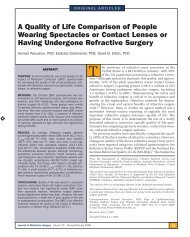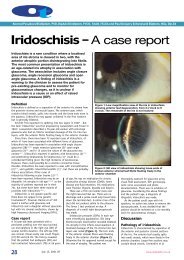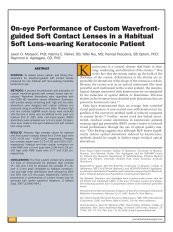Recall from informed consent counselling for cataract ... - Pesudovs
Recall from informed consent counselling for cataract ... - Pesudovs
Recall from informed consent counselling for cataract ... - Pesudovs
Create successful ePaper yourself
Turn your PDF publications into a flip-book with our unique Google optimized e-Paper software.
<strong>Recall</strong> <strong>from</strong> <strong>in<strong>for</strong>med</strong> <strong>consent</strong> <strong>counselling</strong> <strong>for</strong> <strong>cataract</strong><br />
surgery<br />
Konrad <strong>Pesudovs</strong>, Carolyn K Luscombe and Douglas J Coster<br />
The authors investigated the effect of giving written material on in<strong>for</strong>mation<br />
recall <strong>from</strong> <strong>in<strong>for</strong>med</strong> <strong>consent</strong> <strong>counselling</strong> <strong>for</strong> <strong>cataract</strong> surgery. Fifty Englishspeaking<br />
patients who underwent non-urgent <strong>cataract</strong> extraction at Flinders<br />
Medical Centre, South Australia, were prospectively enrolled. Systematic<br />
<strong>counselling</strong> <strong>for</strong> <strong>cataract</strong> surgery was provided, with a written copy of the content<br />
given to a randomly selected group of patients (n = 24). All subjects completed<br />
a questionnaire after <strong>counselling</strong> and again at two weeks after surgery to test<br />
their satisfaction with, and recall of, in<strong>for</strong>mation provided. Patients were found<br />
to be satisfied with the amount of in<strong>for</strong>mation they received and most were able<br />
to recall details about the <strong>cataract</strong> surgery procedure. However, many could not<br />
recall success rates or complication rates and only a minority could list any<br />
complication. The provision of written in<strong>for</strong>mation did not significantly alter recall<br />
(p>0.05). <strong>Recall</strong> was significantly better immediately after <strong>counselling</strong> than two<br />
weeks after surgery (p
considered the influence of age, education, previous <strong>cataract</strong> surgery, anxiety and gender, and<br />
concluded that retention was poorer in older patients and patients with a low standard of<br />
education. 5 Vallance et al found poor recall of specific details related to <strong>cataract</strong> surgery initially<br />
after <strong>consent</strong> was obtained with deterioration of recall one month later. 6 It has been established<br />
that older patients have more trouble recalling in<strong>for</strong>mation presented <strong>for</strong> <strong>in<strong>for</strong>med</strong> <strong>consent</strong>, but<br />
other factors may influence this age-related decline, including education level and environmental<br />
exposure. 7 The recall of in<strong>for</strong>mation deteriorates <strong>from</strong> the time the in<strong>for</strong>mation is provided. 8<br />
The current authors investigated how much in<strong>for</strong>mation patients recall after pre-operative<br />
<strong>counselling</strong> <strong>for</strong> <strong>cataract</strong> surgery and again after surgery. Fifty patients who were considered to<br />
require <strong>cataract</strong> surgery were given in<strong>for</strong>mation about the benefits and risks of the procedure. All<br />
were given the relevant in<strong>for</strong>mation verbally and half were randomly assigned to receive the same<br />
in<strong>for</strong>mation in printed <strong>for</strong>m. A questionnaire was used to assess their ability to recall the<br />
in<strong>for</strong>mation that they had been given. This was administered immediately after the provision of<br />
<strong>in<strong>for</strong>med</strong> <strong>consent</strong> and again two weeks after <strong>cataract</strong> surgery. Factors influencing a patient’s<br />
ability to recall the in<strong>for</strong>mation were assessed statistically.<br />
This simple method of evaluating the effectiveness of achieving <strong>in<strong>for</strong>med</strong> <strong>consent</strong> was<br />
used because it follows procedures commonly used in clinical practice. It looks at a particular<br />
procedure, <strong>cataract</strong> surgery, which is one of the most frequently per<strong>for</strong>med operations and it uses<br />
recall as the test strategy; the test commonly used in educational and legal institutions.<br />
METHODS<br />
Fifty adult patients who agreed to participate were all being booked <strong>for</strong> routine non-urgent <strong>cataract</strong><br />
extraction with intraocular lens insertion under local anaesthesia. All were <strong>from</strong> an Englishspeaking<br />
background.<br />
To ensure all patients received identical <strong>counselling</strong> we carefully developed an in<strong>for</strong>mation<br />
sheet explaining the risks and benefits of <strong>cataract</strong> surgery (Appendix). This was written in as<br />
simple terms as possible, minimising jargon, and including all important content areas <strong>for</strong> <strong>cataract</strong><br />
surgery <strong>in<strong>for</strong>med</strong> <strong>consent</strong>. 9 The reading age of the in<strong>for</strong>mation was independently assessed to be 8<br />
years of age. This in<strong>for</strong>mation sheet was read to patients as part of the clinical consultation with<br />
the doctor. The patient was given the opportunity to respond, and any questions asked were<br />
answered according to the current clinical standards and the in<strong>for</strong>mation was reiterated where<br />
appropriate.<br />
After agreeing to participate in the study, patients were asked to complete the document<br />
entitled ‘In<strong>for</strong>med Consent In Eye Surgery: Questionnaire’ (the questionnaire). The content area<br />
of the questionnaire included important aspects of outcomes and potential complications as well as<br />
patient satisfaction with the <strong>in<strong>for</strong>med</strong> <strong>consent</strong> process. The questionnaire was written with a<br />
combination of closed and open questions. Closed questions were asked wherever appropriate, to<br />
minimise errors in interpretation during the analysis (see Table 1).<br />
Understanding of the In<strong>for</strong>med Consent <strong>for</strong> Cataract Surgery," (1996) 15 J Ophthalmic Nurs Technol 216, CG Kiss, S<br />
Richter-Mueksch, E Stifter, G Diendorfer-Radner, M Velikay-Parel, and W Radner, "In<strong>for</strong>med Consent and Decision<br />
Making by Cataract Patients," (2004) 122 Arch Ophthalmol 94, D Scanlan, F Siddiqui, G Perry, and CM Hutnik,<br />
"In<strong>for</strong>med Consent <strong>for</strong> Cataract Surgery: What Patients Do and Do Not Understand," (2003) 29 J Cataract Refract<br />
Surg 1904.<br />
5<br />
LW Morgan, and IR Schwab, "In<strong>for</strong>med Consent in Senile Cataract Extraction," (1986) 104 Arch Ophthalmol 42.<br />
6<br />
JH Vallance, M Ahmed, and B Dhillon, "Cataract Surgery and Consent; <strong>Recall</strong>, Anxiety, and Attitude toward<br />
Trainee Surgeons Preoperatively and Postoperatively," (2004) 30 J Cataract Refract Surg 1479.<br />
7<br />
RP Kessels, "Patients' Memory <strong>for</strong> Medical In<strong>for</strong>mation," (2003) 96 J R Soc Med 219,<br />
J Sugarman, DC McCrory, and RC Hubal, "Getting Meaningful In<strong>for</strong>med Consent <strong>from</strong> Older Adults: A Structured<br />
Literature Review of Empirical Research," (1998) 46 J Am Geriatr Soc 517, SA Small, Y Stern, M Tang, and R<br />
Mayeux, "Selective Decline in Memory Function among Healthy Elderly," (1999) 52 Neurology 1392.<br />
8<br />
C Lavelle-Jones, DJ Byrne, P Rice, and A Cuschieri, "Factors Affecting Quality of In<strong>for</strong>med Consent," (1993) 306<br />
BMJ 885.<br />
9<br />
H Brown, M Ramchandani, JT Gillow, and MD Tsaloumas, "Are Patient In<strong>for</strong>mation Leaflets Contributing to<br />
In<strong>for</strong>med Consent <strong>for</strong> Cataract Surgery?," (2004) 30 J Med Ethics 218.<br />
497
Table 1. The questionnaire and corresponding correct answers<br />
Question Response options <strong>for</strong><br />
closed questions<br />
1. Have you had previous eye surgery? Yes/No<br />
If yes, what was your operation <strong>for</strong>? Open<br />
2. What is the condition <strong>for</strong> which you<br />
are going to have surgery?<br />
3. How much in<strong>for</strong>mation were you<br />
given about your operation?<br />
4. Did you feel you understood the<br />
in<strong>for</strong>mation you were given?<br />
5. Did you feel you were given the<br />
opportunity to ask questions?<br />
6. What are the alternative <strong>for</strong>ms of<br />
treatment <strong>for</strong> your eye condition, if<br />
any?<br />
7. How often is the operation<br />
successful?<br />
8. Do you think you will need glasses<br />
after the operation?<br />
498<br />
Correct response<br />
N/A<br />
Open Cataract<br />
Too much/Enough/Too<br />
little<br />
Yes/No<br />
Yes/No<br />
N/A<br />
N/A<br />
N/A<br />
Open Defer surgery<br />
No medical alternative<br />
Open 95.0 to 99.5 per cent<br />
inclusive<br />
Yes/Possibly/No/Don’t Yes or possibly<br />
know<br />
9. Will something be implanted in the<br />
eye?<br />
Yes/No/Don’t know Yes<br />
10(a). Is there a risk you may lose the Yes/No/Don’t know Yes<br />
sight in the eye?<br />
1 in 200<br />
10(b). If yes, how often does this<br />
happen?<br />
Open<br />
11. Please list all the complications of Open (i) Haemorrhage<br />
the surgery that you can recall.<br />
(ii) Infection<br />
(iii) Retinal detachment<br />
(iv) Damage to capsule<br />
(v) Optic nerve<br />
damage*<br />
• Exact wording not required; maximum score of five.<br />
Patients were randomly assigned to the group receiving a written copy of the in<strong>for</strong>mation; patients<br />
with an even hospital record number were given the written copy. They were asked to read the<br />
material and to take it home and read it again. The questionnaire was repeated by telephone two<br />
weeks after surgery. The study complied with the principals of the Declaration of Helsinki, and<br />
was approved by the Flinders University Ethics Committee.<br />
Patient demographics were assessed by inspection and matching of the two groups<br />
determined by ANOVA and Chi-square testing. Responses to the questionnaire were reported by<br />
inspection and tested <strong>for</strong> the significance of difference between groups by Chi-square testing.<br />
Changes over time were tested by Wilcoxon sign rank test. We also attempted to identify factors<br />
that may affect patients’ understanding of the in<strong>for</strong>mation they were given. These included age of<br />
the patient, gender, previous eye surgery, whether the patient had been given a written copy of the<br />
risks and benefits of surgery, and the time difference between pre-operative and post-operative<br />
responses. The effects of these factors were tested with Chi-square testing or logistic regression.<br />
Statistical analyses were per<strong>for</strong>med using the software program Statistical Package <strong>for</strong> Social<br />
Sciences (SPSS) v12.0.1 (SPSS Inc). Figures were drawn using KaleidaGraph v3.51 (Synergy<br />
Software).
RESULTS<br />
Of the 50 patients in the study group, 19 were males and 31 females. Mean age at the time of preoperative<br />
completion of the questionnaire was 69.9 (SD 11.6) years. Twenty-four were assigned<br />
to receive a written copy of the instructions and 26 were assigned to not receive a copy. The two<br />
groups were similar <strong>for</strong> gender (received written copy, 16 females and 8 males; no written copy,<br />
15 females and 11 males χ 2 =-0.43, p>0.05) and age (received written copy, 72.6 (SD 11.6) years,<br />
no written copy 67.7 (SD 11.4) years ANOVA F=1.93, p>0.05).<br />
The questionnaire was completed an average of 10.1 (SD 16.1) minutes after the preoperative<br />
signing of the surgery <strong>consent</strong> <strong>for</strong>m. All patients received <strong>cataract</strong> surgery under local<br />
anaesthesia by phacoemulsification with intraocular lens implantation. There were no surgical or<br />
post-operative complications. The questionnaire was completed post-operatively an average of<br />
79.0 (SD 53.2) days after the pre-operative completion.<br />
Table 2 lists the correct response rate on each question <strong>for</strong> both groups and at both timepoints.<br />
All questions were tested <strong>for</strong> significant differences between groups and between visits.<br />
There were 3 questions <strong>for</strong> which recall significantly deteriorated <strong>from</strong> the pre-operative visit to<br />
the post-operative visit. There were no questions on which the group who took written in<strong>for</strong>mation<br />
home per<strong>for</strong>med significantly differently to the group who did not take written in<strong>for</strong>mation home<br />
(χ 2 , p>0.05). However, on two questions (7 & 10b) deterioration of recall <strong>from</strong> the pre-operative<br />
visit to the post-operative visit was only significantly worse <strong>for</strong> the group that did not take home<br />
the written in<strong>for</strong>mation. Even though the groups were not significantly different when directly<br />
compared at either the pre-operative or post-operative testing, it could be argued that there was a<br />
trend towards a difference which may be significant with a much larger sample (sample size<br />
calculation based on question 7 with a type 1 error of 0.05 and a power of 80%, a sample size of<br />
304 in each group would be required). While this may be true, the level of recall on these<br />
questions remains extremely poor <strong>for</strong> both groups.<br />
Table 2. Frequency of responses pre-operatively and post-operatively<br />
Question 1. Have you had previous eye surgery?<br />
Total (n=50)<br />
Yes<br />
64.0%<br />
Pre-op responses Post-op responses<br />
No<br />
36.0%<br />
Question 2. What is the condition <strong>for</strong> which you are going to have surgery?<br />
Total (n=50)<br />
Written copy (n=24)<br />
No written copy (n=26)<br />
Correct<br />
92.0%<br />
100.0%<br />
84.6%<br />
Pre-op responses Post-op responses<br />
Incorrect<br />
8.0%<br />
0.0%<br />
15.4%<br />
499<br />
–<br />
Correct<br />
94.0%<br />
95.8%<br />
92.3%<br />
Question 3. How much in<strong>for</strong>mation were you given about your operation?<br />
Total (n=50)<br />
Written copy (n=24)<br />
No written copy (n=26)<br />
Too<br />
much<br />
0.0%<br />
–<br />
–<br />
–<br />
Incorrect<br />
6.0%<br />
4.2%<br />
7.7%<br />
Pre-op responses Post-op responses<br />
Enough Too little Too<br />
much<br />
Enough Too little<br />
100.0% 0.0% 0.0% 94.0% 6.0%<br />
– – – 95.8% 4.2%<br />
– – – 92.3% 7.7%
Question 4. Did you feel you understood the in<strong>for</strong>mation you were given?<br />
Total (n=50)<br />
Yes<br />
100.0%<br />
Pre-op responses Post-op responses<br />
No<br />
0.0%<br />
500<br />
Yes<br />
100.0%<br />
Question 5. Did you feel you were given the opportunity to ask questions?<br />
Total (n=50)<br />
Written copy (n=24)<br />
No written copy (n=26)<br />
Yes<br />
96%<br />
95.8%<br />
96.2%<br />
No<br />
0.0%<br />
Pre-op responses Post-op responses<br />
No<br />
4%<br />
4.2%<br />
3.8%<br />
Yes<br />
90%<br />
87.5%<br />
92.3%<br />
No<br />
10%<br />
12.5%<br />
7.7%<br />
Question 6. What are the alternative <strong>for</strong>ms of treatment <strong>for</strong> your eye condition, if any?<br />
Total (n=50)<br />
Written copy (n=24)<br />
No written copy (n=26)<br />
Correct<br />
88.0%<br />
91.7%<br />
84.6%<br />
Pre-op responses Post-op responses<br />
Incorrect<br />
12.0%<br />
8.3%<br />
15.4%<br />
Question 7. How often is the operation successful?<br />
Total (n=50)*<br />
Written copy (n=24)<br />
No written copy (n=26)*<br />
Correct<br />
56.0%<br />
50.0%<br />
61.5%<br />
Correct<br />
86.0%<br />
83.3%<br />
88.5%<br />
Incorrect<br />
14.0%<br />
16.7%<br />
11.5%<br />
Pre-op responses Post-op responses<br />
Incorrect<br />
44.0%<br />
50.0%<br />
38.5%<br />
Correct<br />
36.0%<br />
41.7%<br />
30.8%<br />
Question 8. Do you think you will need glasses after the operation?<br />
Total (n=50)<br />
Written copy<br />
(n=24)<br />
No written copy<br />
(n=26)<br />
Yes<br />
64.0%<br />
66.7%<br />
61.5%<br />
Incorrect<br />
64.0%<br />
58.3%<br />
69.2%<br />
Pre-op responses Post-op responses<br />
Possibly No Don’t<br />
know<br />
Yes Possibly No<br />
20.0% 4.0% 12.0% 74.0% 16.0% 0.0%<br />
16.7%<br />
23.1%<br />
0.0%<br />
7.7%<br />
16.7%<br />
7.7%<br />
Question 9. Will something be implanted in the eye?<br />
Total (n=50)<br />
Written copy (n=24)<br />
No written copy (n=26)<br />
Yes<br />
90.0%<br />
91.7%<br />
88.5%<br />
70.8%<br />
76.9%<br />
12.5%<br />
19.2%<br />
Pre-op responses Post-op responses<br />
No<br />
2.0%<br />
8.3%<br />
3.8%<br />
Don’t know<br />
8.0%<br />
0.0%<br />
7.7%<br />
Yes<br />
90.0%<br />
83.3%<br />
96.2%<br />
Question 10(a). Is there a risk you may lose the sight in the eye?<br />
Total (n=50)<br />
Written copy (n=24)<br />
No written copy (n=26)<br />
Yes<br />
76.0%<br />
70.8%<br />
80.8%<br />
No<br />
0.0%<br />
–<br />
–<br />
–<br />
–<br />
Don’t<br />
know<br />
10.0%<br />
16.7%<br />
3.8%<br />
Don’t know<br />
10.0%<br />
16.7%<br />
3.8%<br />
Pre-op responses Post-op responses<br />
No<br />
16.0%<br />
12.5%<br />
19.2%<br />
Don’t know<br />
8.0%<br />
16.7%<br />
0.0%<br />
Yes<br />
68.0%<br />
62.5%<br />
73.1%<br />
No<br />
22.0%<br />
25.0%<br />
19.2%<br />
Don’t know<br />
10.0%<br />
12.5%<br />
7.7%
Question 10(b) If yes, how often does this happen?<br />
Total (n=50)*<br />
Written copy (n=24)<br />
No written copy (n=26)*<br />
Correct<br />
44.7% (n=38)<br />
52.9% (n=17)<br />
38.1% (n=21)<br />
Pre-op responses Post-op responses<br />
Incorrect<br />
55.3%<br />
47.1%<br />
61.9%<br />
Correct<br />
20.6% (n=34)<br />
33.0% (n=15)<br />
10.5% (n=19)<br />
Incorrect<br />
79.4%<br />
66.0%<br />
89.5%<br />
Question 11. Please list all the complications of the surgery you can recall<br />
Pre-op responses Post-op responses<br />
5 4 3 2 1 0 5 4 3 2 1<br />
Total<br />
(n=50)*<br />
Written<br />
copy<br />
0.0% 2.0% 6.0% 16.0% 26.0% 50.0% 0.0% 0.0% 2.0% 8.0% 14.0%<br />
(n=24)*<br />
No<br />
written<br />
copy<br />
– 4.2% 8.3% 16.7% 20.8% 50.0% – – 0.0% 12.5% 20.8%<br />
(n=26)* – - 3.8% 15.4% 30.8% 50.0% – – 3.8% 3.8% 7.7%<br />
* Pre-op responses significantly poorer than post-op responses (Wilcoxon signed rank test, p0.05). The decrease in recall that occurred<br />
post-surgery was significantly different <strong>for</strong> both groups (Wilcoxon sign rank test, p
potential complications (p0.05).<br />
DISCUSSION<br />
These results of the questionnaire indicate that not all in<strong>for</strong>mation given to patients as part of the<br />
<strong>in<strong>for</strong>med</strong> <strong>consent</strong> process can be recalled; in<strong>for</strong>mation regarding the rate and possible<br />
complications of surgery is poorly retained. This was despite being given appropriate in<strong>for</strong>mation,<br />
carefully written in everyday common language with an independently verified reading age of 8<br />
years. Moreover, all patients pre-operatively confirmed that they were happy with the in<strong>for</strong>mation<br />
they had received. Post-operatively some reported that they should have received more<br />
in<strong>for</strong>mation but they wanted to know more about the process rather than benefits and risks. These<br />
findings are similar to previous studies. 10<br />
The provision of <strong>in<strong>for</strong>med</strong> <strong>consent</strong> <strong>for</strong> this group of patients is all that can reasonably be<br />
done, and is what is done in most clinical settings. Indeed, clinical staff believed all patients had<br />
an adequate understanding of the risks and benefits of <strong>cataract</strong> surgery. This highlights the<br />
difficulty clinicians have in evaluating whether a patient understands what they are told. The poor<br />
recall is both disappointing and disturbing.<br />
Eight percent did not know the name of the operation they were about to have – and 6%<br />
still did not know even after they had been through the procedure. Pre-operatively, only 76%<br />
appreciated that there was any risk of losing vision as a consequence of <strong>cataract</strong> surgery, and 16%<br />
believed there was no risk of this happening. Of those who acknowledged the risk of visual loss,<br />
45% knew the order of the risk.<br />
Recollection of the likelihood of complications decreased post-operatively. Patients had<br />
particularly poor recollection of specific complications, with half the patients unable to remember<br />
any specific complication. After surgery the level of recollection decreased further. Similar<br />
decreases in recall over time were found by Scanlan et al. 11<br />
The patients who received a written copy of the in<strong>for</strong>mation setting out the benefits and<br />
risks of <strong>cataract</strong> surgery were no more able to recall in<strong>for</strong>mation than those who had only had the<br />
in<strong>for</strong>mation read to them. This result was consistent across all questions.<br />
Most previous studies of the benefit of providing written in<strong>for</strong>mation either show no<br />
benefit or limited benefits of such material. 12 Either way, recall of <strong>in<strong>for</strong>med</strong> <strong>consent</strong> in<strong>for</strong>mation<br />
is poor with approximately 50% of questions correctly answered across studies. Only Scanlan et al<br />
report a significant benefit to providing written in<strong>for</strong>mation to supplement <strong>in<strong>for</strong>med</strong> <strong>consent</strong> <strong>for</strong><br />
<strong>cataract</strong> surgery. 13 They found at 1 week post-surgery those given literature had 64% recall<br />
whereas those without had only 44% recall. 14 Given our findings and others, we suspect that<br />
10 D Scanlan, F Siddiqui, G Perry, and CM Hutnik, "In<strong>for</strong>med Consent <strong>for</strong> Cataract Surgery: What Patients Do and Do<br />
Not Understand," (2003) 29 J Cataract Refract Surg 1904, JH Vallance, M Ahmed, and B Dhillon, "Cataract Surgery<br />
and Consent; <strong>Recall</strong>, Anxiety, and Attitude toward Trainee Surgeons Preoperatively and Postoperatively," (2004) 30 J<br />
Cataract Refract Surg 1479.<br />
11 ibid<br />
12 TF Brown, E Massoud, and M Bance, "In<strong>for</strong>med Consent in Otologic Surgery: Prospective Study of Risk <strong>Recall</strong> by<br />
Patients and Impact of Written Summaries of Risk," (2003) 32 J Otolaryngol 368, Y Chan, JC Irish, SJ Wood, LE<br />
Rotstein, DH Brown, PJ Gullane, and GA Lockwood, "Patient Education and In<strong>for</strong>med Consent in Head and Neck<br />
Surgery," (2002) 128 Arch Otolaryngol Head Neck Surg 1269, P Graham, "Type of Consent Does Not Influence<br />
Patient <strong>Recall</strong> of Serious Potential Radiation Toxicity of Adjuvant Breast Radiotherapy," (2003) 47 Australas Radiol<br />
416, IJ Langdon, R Hardin, and ID Learmonth, "In<strong>for</strong>med Consent <strong>for</strong> Total Hip Arthroplasty: Does a Written<br />
In<strong>for</strong>mation Sheet Improve <strong>Recall</strong> by Patients?," (2002) 84 Ann R Coll Surg Engl 404, AS Makdessian, DA Ellis,<br />
and JC Irish, "In<strong>for</strong>med Consent in Facial Plastic Surgery: Effectiveness of a Simple Educational Intervention,"<br />
(2004) 6 Arch Facial Plast Surg 26, P Turner, and C Williams, "In<strong>for</strong>med Consent: Patients Listen and Read, but<br />
What In<strong>for</strong>mation Do They Retain?," (2002) 115 N Z Med J 218.<br />
13 D Scanlan, F Siddiqui, G Perry, and CM Hutnik, "In<strong>for</strong>med Consent <strong>for</strong> Cataract Surgery: What Patients Do and Do<br />
Not Understand," (2003) 29 J Cataract Refract Surg 1904.<br />
14 Ibid.<br />
502
Scanlan et al’s results over-estimate the impact of written in<strong>for</strong>mation upon recall and this is<br />
probably due to small numbers (2 groups of 14 patients) and no report of age matching of the two<br />
groups.<br />
The present results support previous findings that younger patients could better recall<br />
in<strong>for</strong>mation provided <strong>for</strong> <strong>in<strong>for</strong>med</strong> <strong>consent</strong>. 15 The patient’s gender did not influence the results,<br />
nor did previous eye surgery, previous <strong>cataract</strong> surgery, or time lapsed between pre-operative and<br />
post-operative assessment. This is in line with previous studies. 16<br />
Kiss et al hypothesised that poor recall of names and rates complications of <strong>cataract</strong><br />
surgery may reflect cognitive dissonance meaning the patient does not want to associate the<br />
decision to proceed with surgery with the possibility of a poor outcome. 17 This concept is<br />
supported by research showing that people prefer to give greater weight to in<strong>for</strong>mation supporting<br />
their decision compared to issues against the decision. 18 This may affect in<strong>for</strong>mation recall if this<br />
“less important” in<strong>for</strong>mation is less well remembered.<br />
The poor recall demonstrated in this study is cause <strong>for</strong> concern. The legal requirement is<br />
that doctors not only provide patients with in<strong>for</strong>mation relevant to their treatments and procedures,<br />
but that patients understand the in<strong>for</strong>mation they are given. If surgery were to be restricted to<br />
those patients who can confirm by recall that they understand what they have been told, many<br />
patients who could benefit <strong>from</strong> sight-restoring surgery would be denied the opportunity. Elderly<br />
patients, in particular, would be disadvantaged.<br />
More strenuous attempts at achieving <strong>in<strong>for</strong>med</strong> <strong>consent</strong> are possible. Video recordings of<br />
in<strong>for</strong>mation and interactive computer-based systems have been used in some places. Whether this<br />
approach is acceptable to elderly patients and whether it results in better recall is unconfirmed. 19<br />
It may be that the resistance to learning in patients like these is affected by biological factors, such<br />
as age, 20 and also psychological and cultural factors as yet undefined. For example, many<br />
patients <strong>for</strong> one reason or another are prepared to trust their medical attendants to make medical<br />
decisions <strong>for</strong> them. Such patients have no motivation to digest, understand or recall what is said to<br />
them by their doctors. Whatever the reasons <strong>for</strong> the poor recall of in<strong>for</strong>mation in this typical<br />
group of <strong>cataract</strong> patients, it is clear that the legal requirements are difficult to achieve, at least in<br />
this group of patients. What is required by law and what is achievable in clinical practice seem<br />
out of step.<br />
CONCLUSION<br />
Patient’s ability to recall in<strong>for</strong>mation provided during the <strong>in<strong>for</strong>med</strong> <strong>consent</strong> process is poor.<br />
<strong>Recall</strong> deteriorates with time after surgery and is not improved by the provision of written<br />
material.<br />
15<br />
RP Kessels, "Patients' Memory <strong>for</strong> Medical In<strong>for</strong>mation," (2003) 96 J R Soc Med 219, LW Morgan, and IR<br />
Schwab, "In<strong>for</strong>med Consent in Senile Cataract Extraction," (1986) 104 Arch Ophthalmol 42.<br />
16<br />
Ibid.<br />
17<br />
CG Kiss, S Richter-Mueksch, E Stifter, G Diendorfer-Radner, M Velikay-Parel, and W Radner, "In<strong>for</strong>med Consent<br />
and Decision Making by Cataract Patients," (2004) 122 Arch Ophthalmol 94.<br />
18<br />
E Jonas, S Schulz-Hardt, D Frey, and N Thelen, "Confirmation Bias in Sequential In<strong>for</strong>mation Search after<br />
Preliminary Decisions: An Expansion of Dissonance Theoretical Research on Selective Exposure to In<strong>for</strong>mation,"<br />
(2001) 80 J Pers Soc Psychol 557.<br />
19<br />
FA Campbell, BD Goldman, ML Boccia, and M Skinner, "The Effect of Format Modifications and Reading<br />
Comprehension on <strong>Recall</strong> of In<strong>for</strong>med Consent In<strong>for</strong>mation by Low-Income Parents: A Comparison of Print, Video,<br />
and Computer-Based Presentations," (2004) 53 Patient Educ Couns 205.<br />
20<br />
RP Kessels, "Patients' Memory <strong>for</strong> Medical In<strong>for</strong>mation," (2003) 96 J R Soc Med 219, C Lavelle-Jones, DJ Byrne,<br />
P Rice, and A Cuschieri, "Factors Affecting Quality of In<strong>for</strong>med Consent," (1993) 306 BMJ 885, LW Morgan, and<br />
IR Schwab, "In<strong>for</strong>med Consent in Senile Cataract Extraction," (1986) 104 Arch Ophthalmol 42, J Sugarman, DC<br />
McCrory, and RC Hubal, "Getting Meaningful In<strong>for</strong>med Consent <strong>from</strong> Older Adults: A Structured Literature Review<br />
of Empirical Research," (1998) 46 J Am Geriatr Soc 517.<br />
503
APPENDIX: CATARACT SURGERY INFORMATION<br />
The following <strong>cataract</strong> surgery in<strong>for</strong>mation was read aloud to the patient in the outpatient clinic:<br />
You have a <strong>cataract</strong> which is an opacity of the lens in your eye and this accounts <strong>for</strong> your<br />
poor vision.<br />
Since your poor vision is restricting your lifestyle it needs to be improved.<br />
The treatment <strong>for</strong> <strong>cataract</strong>s that affect vision is to remove them and replace your lens with an<br />
artificial lens. There is a standard procedure which is done all around the world <strong>for</strong> this<br />
purpose.<br />
The chances of you getting good vision after surgery are high. More than nineteen out of<br />
twenty patients achieve vision as good as they had twenty or thirty years ago. You may<br />
need spectacles to achieve this vision, either <strong>for</strong> distance vision or <strong>for</strong> reading, or both.<br />
All operations have their risks. The chances of your vision being made worse in the operated<br />
eye is about 1 in 200. Haemorrhage, infection, retinal detachment or damage to the<br />
capsular support system of lens at the time of surgery may occur and result in this loss of<br />
vision.<br />
The surgery is done under local anaesthesia which is safer than having a general anaesthetic<br />
but it too has its risks. Haemorrhage or damage to the optic nerve can occur but this is<br />
very rare.<br />
If you do not have surgery then your vision may stay the same but it is likely to get<br />
progressively worse. It is very unlikely to improve without treatment.<br />
The timing of the surgery is not too important. If you decide to defer the surgery then<br />
nothing is lost. It is no more difficult to do the surgery in a year or two than it is now. It<br />
may take four or five weeks after surgery be<strong>for</strong>e you get your spectacles and achieve your<br />
best vision.<br />
504


